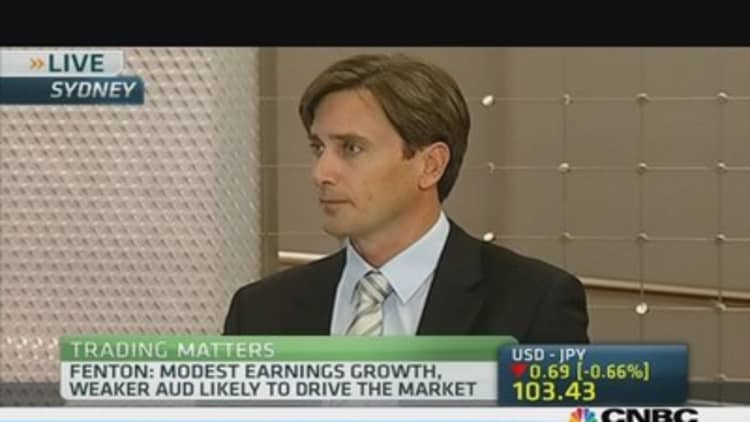Ford's normally busy factory is deserted and eerily quiet. For two weeks the carmaker and dozens of its component suppliers are on a temporary shutdown to cut costs amid slack demand.
"Far worse is coming," says Anthony Anderson, a shop steward who has worked for 30 years at the plant in Geelong, a coastal city of 225,000 people deep in Australia's manufacturing heartland near Melbourne.
"This assembly plant is closing in two years and with it will go thousands of jobs at component suppliers across the region," he says.
It is almost a year since Ford said it would stop making cars in Australia, blaming a strong Aussie dollar, high labor costs and Asian competition. General Motors and Toyota followed when the new government declined to offer extra subsidies, declaring an end to an "era of entitlement" that saw carmakers gobble A$30 billion (US$28 billion) in taxpayer assistance between 1997 and 2012.
Several thousand direct jobs will be lost by 2017 and a further 40,000 suppliers jobs are under threat as the curtain comes down on a century of car manufacturing Down Under. The demise of such an iconic industry is raising questions about the viability of other manufacturing sectors and whether Australia has become too expensive to make things.
"Australian manufacturing has been in relative decline as a share of the economy and of employment for the past 30 years, much like the UK," says Ivan Colhoun, economist at ANZ bank. "That trend seems likely to continue."
(Read more: 2014 a 'litmus test' for Australia economy: Goldman)
Australia's small market, high wages, a strong currency and Canberra's decision to stop corporate handouts were negative forces affecting the sector, he says.
The crunch in manufacturing intensified in the global financial crisis, with 77,000 jobs lost between 2007 and 2012, reducing employment in the sector to 967,000 or 8 percent of the workforce. The industry's troubles, when combined with a sharp slowdown in mining investment, pose a threat to Australia's record of 22 years of consecutive economic growth.
Geelong is bearing the brunt of recent closures, with Alcoa shedding 800 staff in August at an aluminium smelter and Qantas cutting 300 at an aircraft maintenance hub. The city is a bellwether for manufacturing and is becoming a test bed for efforts to revitalise the sector and diversify a blue collar city's economy.

Backwell IXS, a 155-year-old manufacturer, started out making wood stoves before entering the car components market a decade ago and becoming a supplier to Ford and Toyota.
"We could lose 25 percent of our revenues when car making stops," says Bernard Brussow, the company's chief executive.
(Read more: Swan to Hockey: Stop talking down Australia's economy)
Like other components suppliers, half of Backwell's factory is lying idle during Ford's temporary shutdown. But its decision to diversify into the mining, building and solar technology sectors means the rest of the plant is teeming with activity.
"Companies must evolve, find new customers and add value to their products to survive," says Mr Brussow.
Some manufacturers are teaming up with Deakin University in Geelong to co-operate on R&D and design higher-end products.
"Two of our former students have spun out a company called Carbon Revolution, which has designed very light carbon fibre wheels for export," says Jane den Hollander, vice-chancellor of the university. "They are creating 150 jobs and have retrained some former Ford workers."
A report by the Australian Workforce and Productivity Agency says the future for industry depends on incorporating this type of advanced and niche manufacturing at companies integrated into global supply chains. Offering services to support products is another critical element for survival, it says.
More from the Financial Times:
Diplomacy weighs on Tony Abbott's Asia trade mission
How Australia's mining boom spurred on Perth's property market
International invaders shake up Australia's home grown retailers
Ms den Hollander is optimistic about the long-term future for Geelong and Australia, citing its proximity to Asia, natural resources and growing digital economy as strengths. But she warns a painful correction is coming because productivity slipped during the mining boom, causing some manufacturers and their suppliers to close.
Manufacturers say they are caught between sky-rocketing labor and energy costs caused by the resources boom and the phasing-out of tariff protection from foreign competitors by Canberra.
"We don't want government handouts but we need better tailored state supports," says Mr Brussow.
He says state job creation schemes need to be adapted to give companies incentives to retain staff as well as create new positions. State support to reduce energy costs would help manufacturers, he adds.
Even though unemployment in Geelong at 6 percent is low by international standards, concerns about the future are growing as more job cuts occur. Hundreds of people attended a rally this month calling on Canberra to do more to create jobs.
(Read more: Australia economy picks up speed in fourth quarter)
Ben Davis of the Australian Workers Union, who spoke at the rally, says the community is nervous about its future.
"My fear is while government dithers a whole generation of workers are thrown on the scrapheap," he says.

